Protection of the Atmospheric Environment
Boiler Emissions Countermeasures
The Yokkaichi Plant installed flue gas desulfurizers to reduce emissions of sulfur oxides (SOx), and is generating its own power. JSR has also cut emissions of nitrogen oxides (NOx) substantially by installing proprietary burners with low NOx emissions and denitrification equipment. Changes in boiler operating conditions at the Minami Kyodo Power Station, which supplies energy to the Kashima Plant, resulted in lower SOx emissions in FY2010 (April 1, 2009 to March 31, 2010). JSR will continue using the best technology for reducing emissions and will continue to make improvements.
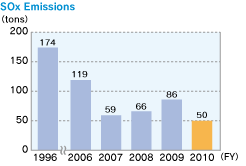
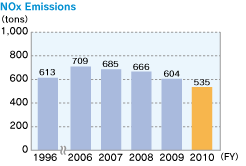
Regarding PRTR
PRTR1 Activities
The PRTR Law2 was enacted in July 1999, and enforced in March 2000. Accordingly, it is now necessary to report PRTR results starting with FY2002. The Japan Chemical Industry Association prioritized PRTR and implemented it ahead of other industries in FY1996, and the scope of the survey has increased each year since then. As a member of the association, JSR will continually implement the survey.
1. Pollutant Release and Transfer Registers (PRTR): A system for registering the emission and movement of environmental pollutants
2. PRTR Law: Law Concerning Reporting, etc. of Releases to the Environment of Specific Chemical Substances and Promoting Improvements in Their Management
The FY2010 results according to the PRTR Law were as follows.
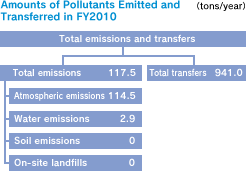
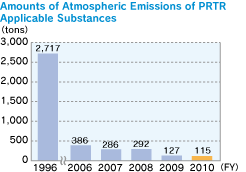
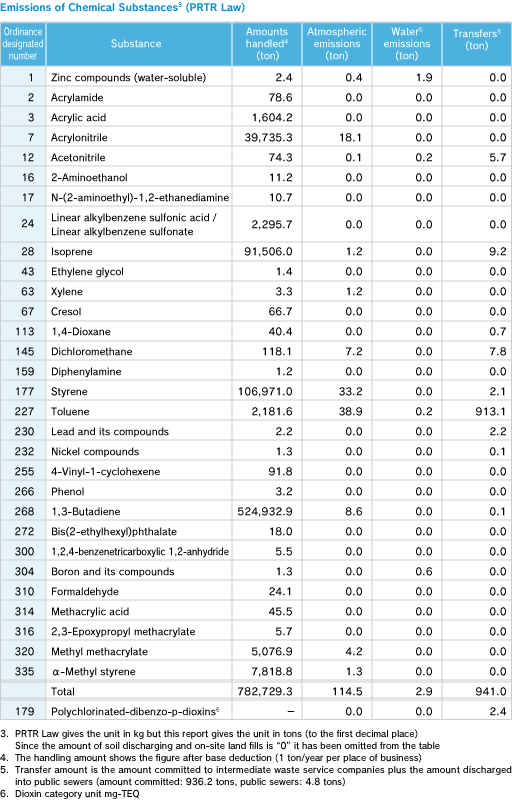
Initiatives for Reducing VOC Emissions into the Atmosphere
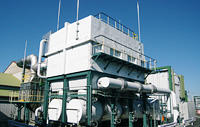
Dried-synthetic rubber waste incinerators at the Chiba Plant
JSR has long taken measures to reduce atmospheric releases of chemicals, but the FY2005 amendment to the Air Pollution Control Law expanded application to all volatile organic compounds (VOCs). VOC is a general term for volatile organic compounds that are gaseous when in the atmosphere. VOCs are believed to be one of the sources of suspended particulate matter and photochemical oxidants, which may have adverse effects on health.
To reduce VOC emissions, five dried-synthetic rubber waste incinerators were installed at three plants between FY2007 and FY2010. As a result, VOC emissions fell by approximately 75% in FY2010 compared to FY2001, reaching our target levels. We are continuing our efforts to further reduce VOC emissions.
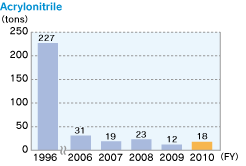
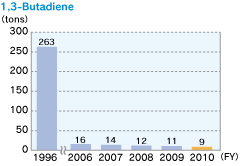
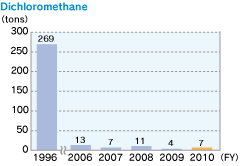
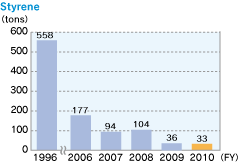
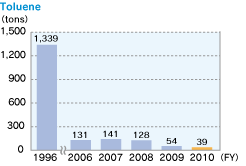
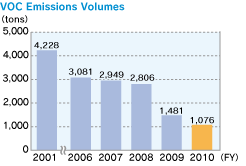
Preservation of Water Quality
JSR performs rigorous wastewater management at all its plants and strives to maintain and improve water quality. JSR is in full compliance with the 6th Total Pollutant Load Control that came into effect in April 2009. We will continue strict monitoring of water quality and will work to further reduce our impact on water quality even further.
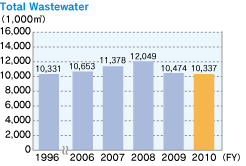
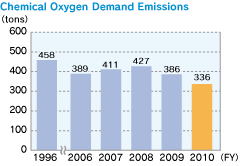
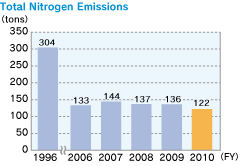
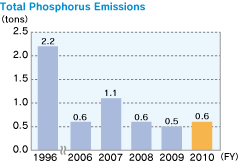
Assessment of Soil and Groundwater Pollution
The ground water (Environmental Quality Standards for Groundwater Pollution) and soil (major items regulated under environmental standards) at all three plants are periodically inspected. As a result, similar to previous years, no problems were found in FY2010.
Asbestos Measures
In accordance with the Ordinance on Prevention of Hazards due to Asbestos, JSR has conducted checks at all its facilities (office, manufacturing, R & D and employee amenity areas), including all Group companies, where asbestos containing materials have been sprayed. As a result, in FY2007, removal and enclosure works were completed at locations in plants where asbestos was found. In addition, we are investigating the replacement of asbestos containing gaskets with non-asbestos containing types and will progressively carry out replacements when safety for use in production has been confirmed.
PCB Management
Polychlorinated biphenyl (PCB) is a highly toxic chemical that does not readily break down and is commonly used in transformers, capacitors, and other devices. JSR stopped using PCB in 92% of its electrical equipment and strictly stocks and manages PCB in accordance with applicable law. We also intend to steadily replace equipment currently containing PCB in accordance with a replacement plan. Under the Law concerning Special Measures for Promotion of Proper Treatment of PCB Wastes, JSR is obligated to complete the processing of all PCB by 2016, and JSR and its Group companies have already completed registration of electrical equipment containing PCB with PCB waste processing facilities. In FY2010, we transferred 3 such units to processing facilities.

Measurement of Ozone-depleting Substances
JSR totally abolished use of carbon tetrachloride in 1994. We are systematically replacing designated equipment containing chlorofluorocarbons with those employing chlorofluorocarbon substitutes. We are also thinking about switching to new chlorofluorocarbon substitutes or other alternatives to chlorofluorocarbon coolants with zero ozone depletion factor.
Return to the top of the page ▲
